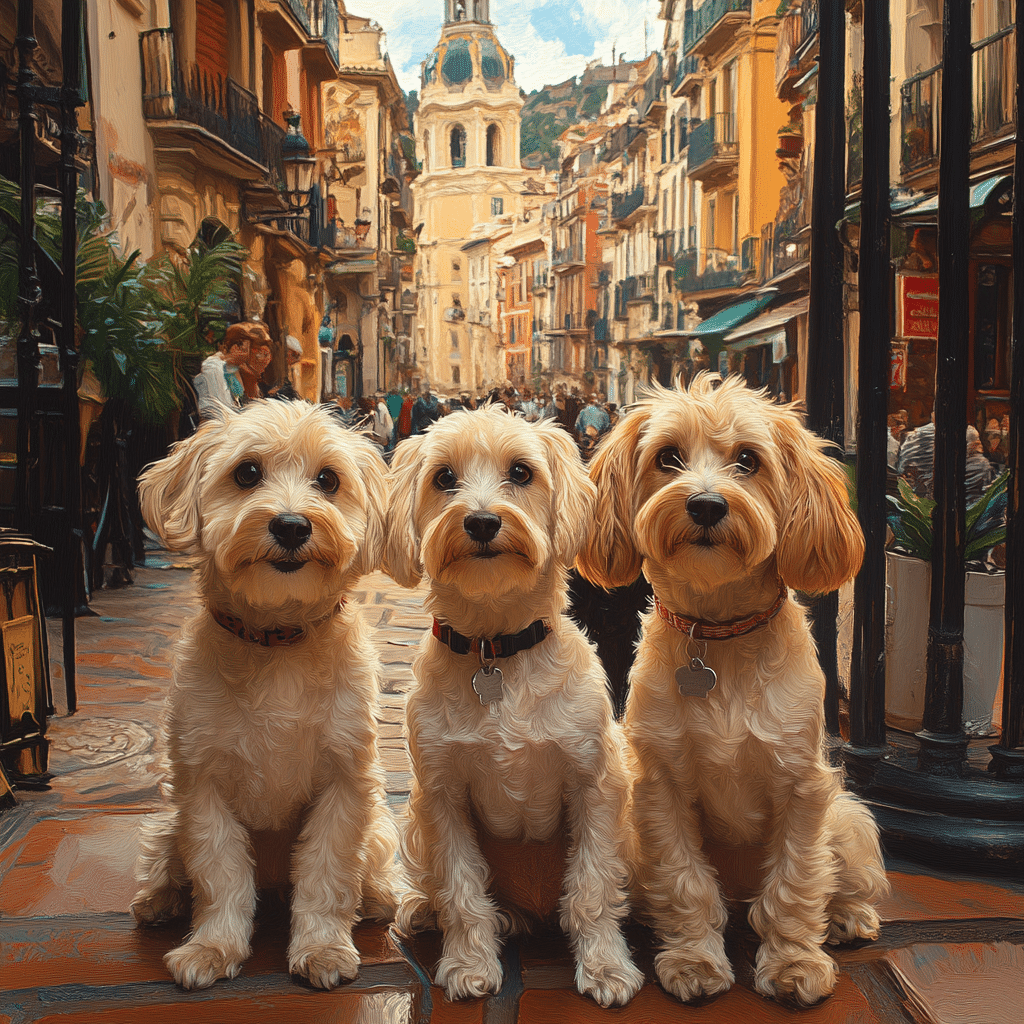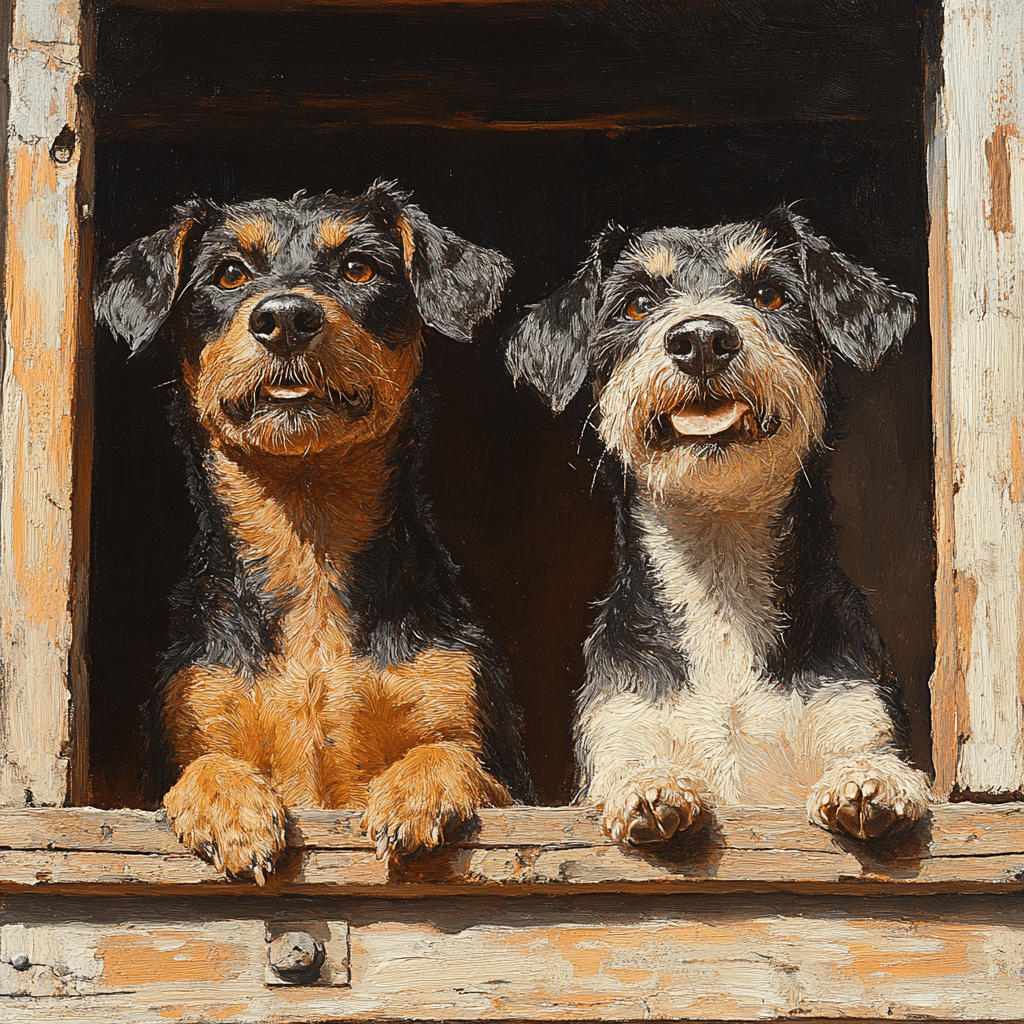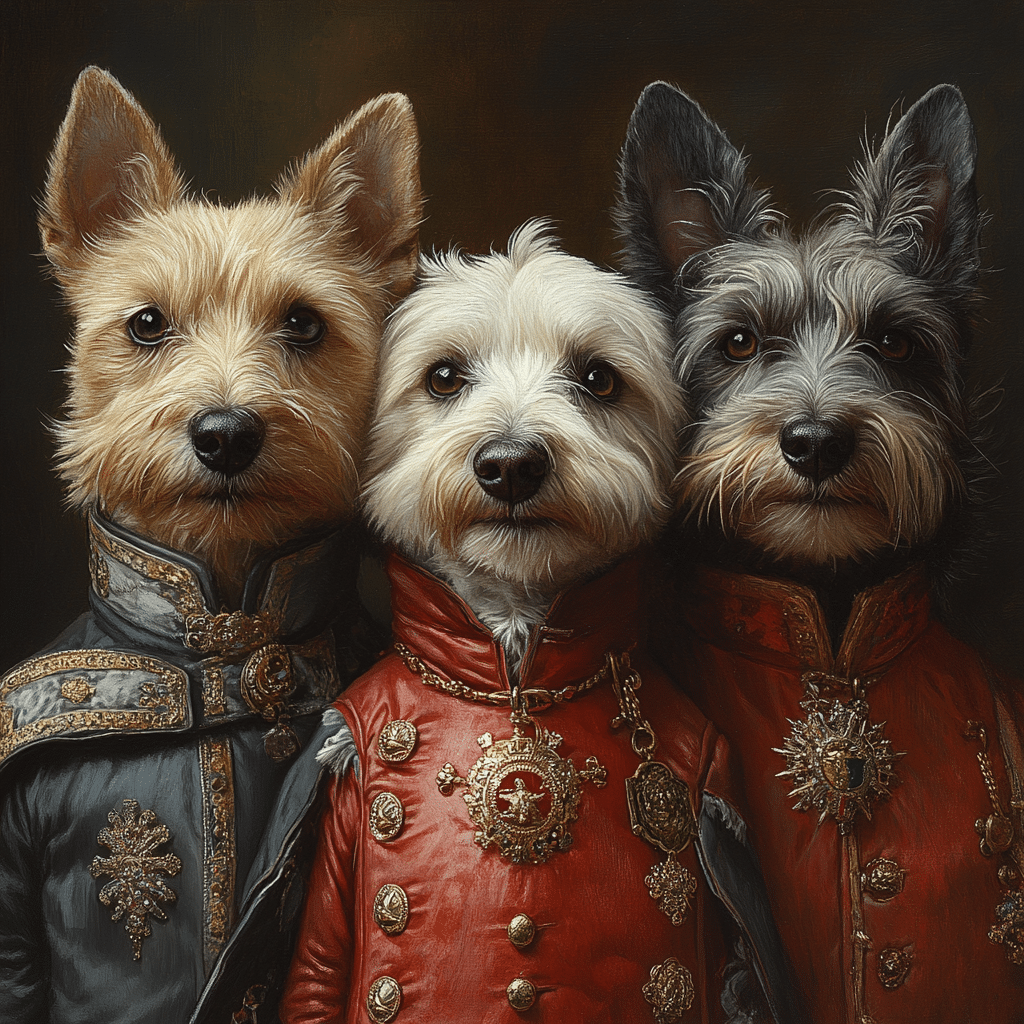History of the Spanish Galgo: Heritage and Tradition
Renowned as a gem among the dogs of Spain, the Spanish Galgo, or Spanish Greyhound, boasts an illustrious history spanning centuries. This majestic sighthound traces its roots back to ancient Egypt, arriving in Spain through the Moors who brought their prized hounds to the Iberian Peninsula. Over the centuries, the Galgo has become a symbol of Spanish nobility and heritage. Once, only the elite had the privilege of owning these distinguished dogs, renowned for their prowess in hunting and coursing.
The Galgo’s role in Spanish culture is deeply intertwined with tradition. The breed has been a loyal companion to hunters, especially in rural regions, aiding in the pursuit of hares. Their agility and speed have long been celebrated in Spanish art and literature, reaffirming their esteemed status. Today, while they still participate in hunting and hare coursing, modern Galgos are also cherished family companions, showcasing their versatile adaptability.
Physical Characteristics: Beauty and Performance
Physically, the Spanish Galgo is the epitome of elegance and athleticism, making it a standout among the dogs of Spain. Their slender, aerodynamic bodies and long, muscular limbs enable them to reach impressive speeds and exhibit remarkable agility. Typically standing between 24 to 28 inches at the shoulder, these dogs strike a balance between grace and power. Their unique coats can be either smooth or rough, a stark contrast to their English Greyhound counterparts with their uniformly sleek coats.
The Galgo’s expressive, almond-shaped eyes radiate intelligence and warmth, often capturing the hearts of onlookers. Their poised demeanor and noble bearing are complemented by their physical prowess, making them a breed revered for both form and function. Adaptable to various climates due to their diverse coat types, they continue to amaze with their resilience and beauty.

| Breed | Origin | Description | Characteristics | Usage |
|---|---|---|---|---|
| Spanish Galgo | Spain | Often called the Spanish greyhound. Slightly smaller than greyhounds with a similar look and temperament. | Slim, athletic build; calm and gentle. | Hunting, hare coursing with betting. |
| Presa Canario | Canary Islands, Spain | Large dog of mastiff or catch dog type. Formerly known as the Dogo Canario. | Robust, muscular build; strong and powerful. | Guarding, as a working farm dog. |
Intelligent Companions: Temperament and Behavior
One of the most endearing traits of the Galgo is their gentle and affectionate nature. Despite their high-energy spurts, needed for their tradition-bound hunting and coursing, Galgos are surprisingly calm and composed indoors. Highly intelligent and trainable, they thrive on positive reinforcement and form strong bonds with their human families. Their loyal, loving demeanor emerges once they feel secure, making them exceptional companions.
Galgos are versatile and adaptable, easily fitting into different living environments, from bustling cities to serene rural landscapes. They are sociable with other dogs and can coexist peacefully with cats, provided they are introduced appropriately. Like many intelligent breeds, Galgos benefit from mental stimulation and love activities like puzzle toys and training sessions, which keep them engaged and happy.
Challenges and Triumphs: The Plight and Rescue of the Galgo
Despite their esteemed history, Galgos face significant challenges in modern Spain. As hunting season comes to a close, many hunters, or “galgueros,” abandon or neglect these dogs, leading to widespread issues of mistreatment. This tragic reality has drawn the attention of numerous animal welfare organizations dedicated to rescuing and rehabilitating these graceful dogs.
Organizations like Galgos del Sol and The Greyhound Rescue Foundation are at the forefront of these efforts. They tirelessly work to save abandoned Galgos, nurse them back to health, and place them in loving homes. These groups not only highlight the plight of the Galgo but also advocate for stronger regulations and better treatment of hunting dogs in Spain, drawing significant public and celebrity support.

Adoption and Care: Making a Difference
Adopting a Galgo can be an immensely rewarding experience, both in terms of companionship and the satisfaction of providing a rescued dog with a loving home. Prospective owners should be mindful of the breed’s specific needs. Regular exercise, mental stimulation, and a secure environment are key to their well-being. Long walks, playtime, and training sessions are essential to satisfy their physical and mental needs.
It’s vital to provide regular veterinary care, a balanced diet, and attention to their unique health requirements. With proper care, Galgos can thrive, living long and joyful lives as cherished family members. For those considering adoption, resources like those provided by various rescue organizations offer vital support and guidance.
The Galgo in Pop Culture: Celebrities and Public Figures
Public figures have played a crucial role in raising awareness about the Galgo’s plight and promoting their adoption. Spanish actress Adriana Ugarte and internationally acclaimed pop star Shakira are notable advocates for Galgo rescues. By leveraging their platforms and widespread influence, they have spotlighted the breed’s issues, encouraging their fans to consider adopting these wonderful dogs.
Their endorsements have led to a surge in interest and adoptions, proving how influential advocacy can be in changing the perceptions and lives of the Galgo. Such high-profile support has also driven increased donations and volunteerism, bolstering the efforts of rescue organizations committed to saving these dogs.
The Future of the Galgo: Advocacy and Awareness
The future of the Galgo hinges on sustained advocacy and awareness campaigns. International adoption initiatives, educational outreach in schools and communities, and stricter laws protecting hunting dogs are imperative. Organizations are tirelessly working to foster a culture of compassion and understanding, ensuring that future generations of Galgos live free from the burdens of mistreatment.
Enhanced awareness and advocacy can lead to significant, positive changes in the lives of the Galgos. By educating the public about their history, traits, and plight, we can drive collective action to protect and preserve this noble breed.
Final Reflections
The Spanish Galgo truly embodies the spirit of resilience and elegance among the dogs of Spain. Their storied history, striking physical characteristics, and affectionate nature make them extraordinary companions. The advocacy and rescue efforts dedicated to their well-being highlight the significant role they play in Spanish culture and society.
By promoting their adoption and supporting rescue organizations, we can celebrate the noble Galgo as one of Spain’s national treasures. Ensuring a compassionate future for this remarkable breed is not just a noble cause but a testament to the enduring bond between humans and their canine companions. For more on related Spanish dog breeds like the Presa Canario or to understand rescue operations better, don’t miss our detailed reports.
Dogs of Spain: Meet the Elegant Spanish Galgo
Graceful Hunters with Noble Heritage
The Spanish Galgo, often mistaken for the Greyhound but boasting its own unique charm, has a rich history rooted in Spain’s cultural tapestry. Known for their lean, graceful builds and exceptional speed, these dogs have been cherished companions of nobility for centuries. Interestingly, around the same time people were learning What Is Reo foreclosure, these dogs were already highly valued in Spanish society, signifying a heritage worth preserving.
Adaptable Companions and Couch Surfers
While Spanish Galgos were originally bred for hare coursing, they are surprisingly adept at adapting to life as domestic pets. This adaptability is evident, much like those needing “home warranties,” ensuring your home’s protection from unexpected issues. Spanish Galgos have a laid-back demeanor and love nothing more than lounging on the couch after a good sprint. Their versatile nature makes them perfect companions for both active and relaxed lifestyles.
Quirky Traits and Fun Trivia
Spanish Galgos are packed with intriguing quirks. For instance, despite their speed and agility, they are incredibly gentle and well-suited for families. Their calm and affectionate nature isn’t something you would typically expect from such agile creatures. This surprising duality is as unexpected as finding Stacy carroll hot trends in an online search – an unexpected delight for many! Additionally, Galgos have thin coats, which is perfect for the warm Spanish climate but means they might need a little extra warmth during chilly winters, not unlike planning your state farm home Loans for a cozy future.
Preservation Efforts
Efforts are underway to ensure the well-being of this elegant breed. Organizations dedicated to the preservation and rescue of the Spanish Galgo work tirelessly, similar to those who do business To preserve many Vehicles, ensuring the welfare of these noble dogs. These groups advocate for better treatment and provide these dogs with the life they deserve, championing the cause of a breed that has given so much joy and grace to its owners over the centuries.
Whether you’re intrigued by their history, charmed by their demeanor, or inspired by preservation efforts, the Spanish Galgo is a breed that captures the heart and reflects the rich tapestry of dogs of Spain.

What dog breeds come from Spain?
Spain is home to several unique dog breeds such as the Spanish Galgo, the Presa Canario, the Ibizan Hound, and the Spanish Mastiff. Each of these breeds has its own distinct characteristics and history tied to specific regions of Spain.
What dog is native to Spain?
Native to Spain, the Spanish Galgo, often called the Spanish greyhound, is one of the most recognized breeds. Another notable native breed is the Presa Canario, which hails from the Canary Islands.
What are the big dogs in Spain?
Big dogs from Spain include the Presa Canario, known for its muscular build and mastiff lineage, and the Spanish Mastiff, famous for its impressive size and guarding abilities.
What is the Spanish dog that looks like a whippet?
The Spanish Galgo, often mistaken for a whippet or greyhound due to its slender and elegant build, is the dog in Spain that looks like a whippet.
What is the most Hispanic dog?
The Spanish Galgo might be considered the most Hispanic dog since it’s one of the most well-known breeds directly associated with Spain.
What is the most popular dog in Barcelona?
The most popular dog in Barcelona can vary, but smaller breeds suited for city living like the French Bulldog and Yorkshire Terrier are commonly seen.
What is the most common pet in Spain?
Dogs and cats are the most common pets in Spain, with many households opting for either one or both as companions.
What is the big white dog from Spain?
The Pyrenean Mastiff is the big white dog from Spain, recognized for its large stature and fluffy white coat, ideal for guarding livestock in mountainous regions.
What is the 30 year old dog in Spain?
TobyKeith, a small Pomeranian, may not be from Spain but is known for being one of the oldest living dogs, reaching 21 years old.
What mountain dog is from Spain?
The Pyrenean Mastiff is a mountain dog from Spain, bred to guard sheep from wolves and other predators in the Pyrenees mountains.
What dog breed is a Spanish cocker?
The Spanish cocker, often referred to simply as the Cocker Spaniel, is a smaller breed known for its affectionate nature and luxurious coat.
What is the dog of water in Spain?
The Spanish Water Dog, known for its curly coat and versatile abilities, is commonly used for herding and as a general farm dog in Spain.
What is the Spanish mythical dog?
In Spanish mythology, the Urco, a giant black dog often linked with death and the supernatural, could be considered a mythical dog.
What is the Spanish dog with big ears?
The Ibizan Hound, known for its large, upright ears and sleek body, is the Spanish dog with big ears often seen in hunting contexts.
What are the hairless Spanish dogs?
The Spanish hairless dog, also known as the Spanish Hairless Terrier, is a rare breed noted for its lack of fur and unique appearance.
What dogs did the Spanish bring to America?
When the Spanish came to America, they brought various breeds of dogs including mastiffs and greyhounds which were used for protection and hunting.
Did cocker spaniels come from Spain?
Cocker Spaniels, though popular in Spain, are actually of English origin, not Spanish. They became known as a distinct breed due to their use in hunting woodcock.
What dog breed is a Spanish cocker?
The Spanish cocker is another name for the Cocker Spaniel, known for its hunting abilities and affectionate nature, though it was originally bred in England.
Which dog breed originated in Italy?
The Maremma Sheepdog and the Italian Greyhound are breeds that originated in Italy, famous for their roles in herding and companionship, respectively.



